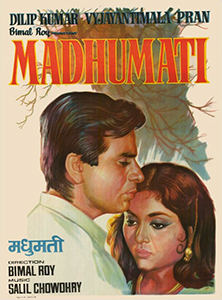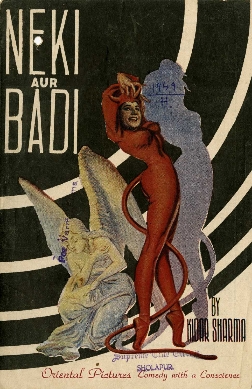
Nutan Samarth Bahl, known mononymously as Nutan, was an Indian actress who worked in Hindi films. In a career spanning nearly four decades, she appeared in more than 70 films, mostly as a protagonist, in both big productions and arthouse films that ranged in genre from urban romances, literary adaptations, to psychological and socio-realist dramas. Regarded as one of the finest actors in the history of Indian cinema, Nutan was noted for her naturalistic acting style in parts of conflicted women often deemed unconventional. Her accolades include a record five Filmfare Awards for Best Actress and the Padma Shri by the Government of India in 1974.

Suraiya Jamal Sheikh, popularly known by the mononym Suraiya, was a popular actress and playback singer in India's Hindi-language films. She was active from 1936 to 1963, and was the most celebrated actress between the mid- to late 1940s, before she was surpassed in fame by Madhubala and Nargis.

Bharatbhushan Bhalla, better known as Bharat Bhushan was an Indian actor in Hindi language films, scriptwriter and producer, who is best remembered for playing Baiju Bawra in the 1952 film of the same name. He was born in Meerut, and brought up in Aligarh, Uttar Pradesh.

Prabodh Chandra Dey, known by his stage name Manna Dey, was an internationally acclaimed and celebrated Indian playback singer, music director, and a musician. As a classical vocalist, he belonged to the Bhendibazaar Gharana and was trained under Ustad Aman Ali Khan. He is considered one of the most versatile and celebrated vocalists of the Hindi film industry, often credited with the success of Indian classical music in Hindi commercial movies. As a musician, Dey is best known for infusing Indian classical music in a pop framework that ushered the golden period in Hindi cinema.

Bimal Roy was an Indian film director. He is particularly noted for his realistic and socialistic films such as Do Bigha Zamin, Parineeta, Biraj Bahu, Devdas, Madhumati, Sujata, Parakh and Bandini, making him an important director of Hindi cinema. Inspired by Italian neo-realistic cinema, he made Do Bigha Zamin after watching Vittorio De Sica's Bicycle Thieves (1948). His work is particularly known for his mise en scène which he employed to portray realism. He won a number of awards throughout his career, including eleven Filmfare Awards, two National Film Awards, and the International Prize of the Cannes Film Festival. Madhumati won 9 Filmfare Awards in 1958, a record held for 37 years.

Pran Krishan Sikand, better known by his mononym, Pran, was an Indian actor, known as the greatest villain ever in the history of Indian cinema and character actor in Hindi cinema from the 1940s to the 1990s. He was one of the most highly successful & respected veteran actors in the history of Indian cinema. He was also one among the highest paid actors of his time.

Devdas is a 1955 Indian Hindi-language period drama film directed by Bimal Roy, based on the Sarat Chandra Chattopadhyay novel Devdas. It starred Dilip Kumar in the titular role, Suchitra Sen in her Bollywood debut as Parvati "Paro", Vyjayanthimala in her first dramatic role where she played courtesan named Chandramukhi. Motilal, Nazir Hussain, Murad, Pratima Devi, Iftekhar, Shivraj were playing other significant roles along with Pran, Johnny Walker in extended cameo appearances.
Sadhana Shivdasani, known mononymously as Sadhana, was an Indian actress who worked in Hindi films, primarily active between 1958-1981. Regarded as one of the finest and iconic actresses of the golden age of Hindi Cinema, Sadhana was noted for her exquisite beauty, understated acting and trend-setting fashion statements. Popularly known as "The Mystery Girl" for her stint as the "mysterious woman" in the suspense thriller trilogy films directed by Raj Khosla during the mid 1960s, Sadhana was ranked among the highest-paid actresses in the country from mid-1960s to early 1970s.

Madhumati is a 1958 Indian Hindi-language paranormal romance film directed and produced by Bimal Roy, and written by Ritwik Ghatak and Rajinder Singh Bedi. The film stars Vyjayanthimala and Dilip Kumar in lead roles, with Pran and Johnny Walker in supporting roles. The plot focuses on Anand, a modern man who falls in love with a tribal woman named Madhumati. But they face challenges in their relationship finally leading to a paranormal consequence. It was ranked 11th in the Outlook Magazine's 25 leading Indian directors' poll for selecting Bollywood's greatest films in 2003.

South Asian cinema refers to the cinema of Afghanistan, Bangladesh, Bhutan, India, Maldives, Nepal, Pakistan and Sri Lanka. The broader terms Asian cinema, Eastern cinema and Oriental cinema in common usage often encompass South Asia as well as East Asia and South East Asia.

Kidar Nath Sharma, also Kedar Sharma, was an Indian film director, producer, screenwriter, and Lyricist of Hindi films. While he had great success as a director of such movies as Neel Kamal (1947), Bawre Nain (1950) and Jogan (1950). He is most remembered for starting the acting careers of popular Bollywood actors like Madhubala, Geeta Bali, Raj Kapoor, Mala Sinha, Bharat Bhushan and Tanuja.
Chitralekha is a 1941 Indian Hindi-language film, directed by Kidar Sharma and based on the 1934 Hindi novel of the same name by Bhagwati Charan Verma. Its music is by noted classical musician Ustad Jhande Khan, giving popular songs like "Sun sun Neelkamal Muskaye," "Saiyyan Saware Bhaye Baware," and "Tum Jao Bde Bhagwan Bane, Insaan Bano."

Chitralekha is a 1964 Indian Hindi-language historical drama film directed by Kidar Sharma and starring Ashok Kumar, Pradeep Kumar and Meena Kumari. It was based on the 1934 Hindi novel of the same name by Bhagwati Charan Verma about Bijgupta serving under the Maurya Empire and the king Chandragupta Maurya and his love for the courtesan Chitralekha. The film's music and lyrics were by Roshan and Sahir Ludhianvi, respectively. The film was noted for songs such as "Sansaar Se Bhaage Phirte Ho" and "Man Re Tu Kaahe na dheer dhare" which is a pensive song which conveys the quintessence of life about letting go of the good and bad. In 2010, Outlook India magazine asked 30 Indian leading composers, lyricists and singers to name their all-time favorite Hindi songs. A list of top 20 songs was published and the top of the chart was ‘Man Re Tu kahe na dheer dhare.’"
Armaan (transl. Desire) also called Arman, is a Bollywood film. It was released in 1942. Arman was the first film that Kidar Sharma directed for Ranjit Studios and also his first in Bombay since his shift from Calcutta. The story, dialogue and lyrics were also by Sharma. It had music by Gyan Dutt. The cinematographer was D. K. Ambre. The cast included Motilal, Shamim, Nagendra Majumdar, Bhagwandas, and Rajkumari.
Vidyapati is a 1937 Bengali biopic film directed by Debaki Bose for New Theatres. It starred Pahari Sanyal as Vidyapati. His costars in the film were Kanan Devi, Prithviraj Kapoor, Chhaya Devi, Leela Desai, K. C. Dey and Kidar Sharma. The music was by R. C. Boral and lyrics by Kidar Sharma. Debaki Bose and Qazi Nazrul Islam wrote the story, screenplay and dialogues. The story is about the Maithili poet and Vaishnava saint Vidyapati. The songs of the film became popular and the lyrics though encapsulating Vidyapati's poetry were considered bold for its time. This however ensured the film garnered crowds at the theatres making it a big success of 1937.
Karodpati is a Hindi/Urdu 1936 comedy film directed by Hemchander Chunder. The film was produced by New Theatres Ltd. Calcutta, and the music was composed by R. C. Boral with the assistance of Pankaj Mullick. The lyrics were written by Kidar Sharma who also acted in the film. The film starred K. L. Saigal, Sardar Akhtar, Molina Devi, Pahari Sanyal, Nawab, Trilok Kapoor, Rajkumari, and Kidar Sharma. The film showcased K. L. Saigal performing a farcical-comedy role which was a different format from his normal tragedy based stories. The story revolves around a cinema-crazy young man who wins a lottery, leading to a series of comedic situations when his friends join him.
Pujarin is a 1936 Hindi social film. It was directed by Prafulla Roy for International Film Craft. The film was based on a story by writer Sarat Chandra Chattopadhyay from his story "Dena Paona". The film was the remake of the Bengali film Dena Paona directed by Premankur Atorthy. The music direction was by Timir Baran with lyrics by Pandit Bhushan and Kidar Sharma.The film starred K. L. Saigal, Chandrabati Devi, K. C. Dey, Pahari Sanyal and Rajkumari. The story is about a reckless immoral youth who marries for money then deserts his wife due to circumstances, only to return as an aristocrat and reform through the love of his wife.
Maa (Mother) is a 1952 Indian Hindi-language social family drama directed by Bimal Roy for Bombay Talkies. Bimal Roy was asked to come to Bombay from Calcutta to direct the film for the studio, which was going through bad times. Bombay Talkies' earlier favourite Leela Chitnis was cast in the eponymous role of Mother. This was the first film Roy directed in Bombay. Later, he was to break away and form his own production company: Bimal Roy Productions. The first film he produced and directed under his new banner was Do Bigha Zameen (1953), the next year.

Neki Aur Badi is a 1949 Indian Hindi-language patriotic drama film directed by Kidar Sharma. The film stars Sharma with Madhubala and Geeta Bali.
Munshiram Varma (1902-1958) was a Bollywood film producer. He was one of six brothers that were founders/partners of Varma Films, a company predominantly involved with the production and distribution of Hindi-language films.











